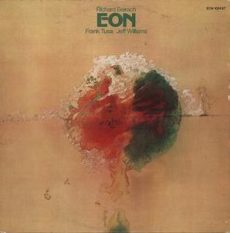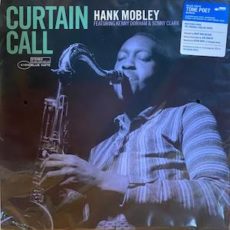
Daily Dose Of Jazz…
David Kenneth Brooks, Jr. was born May 29, 1922 in Fayetteville, North Carolina, the older brother of Tina Brooks. His first professional gig was with the medicine show of Pepper McAllister.
He served in the Army during World War II where he played with James Moody. He moved to New York City after his discharge in 1944, where he played at Minton’s Playhouse and the Harlem Grill. He toured North Carolina in a band alongside Sonny Payne in 1947, then played with George Barkley at the Baby Grand in New York. He first recorded with Barkley around 1947 or 1948, then went on to play with Sonny Thompson from 1948 to 1957.
In 1958 he worked with Jimmy McCracklin and in 1961 with Phil Upchurch. While doing session work with pop musicians in the 1960s. From 1967 to 1973 he played at the Fantasy East in New York City with alto saxophonist Charles Williams and Don Pullen, recording three albums as a trio for Mainstream Records.
After a short run with Jimmy McGriff in 1974, Brooks became a member of Bill Doggett’s ensemble, where he remained for two decades from 1976 to 1996. He worked in the middle of the 1990s with Bross Townsend, Carrie Smith, and the Harlem Blues and Jazz Band, and toured France with Al Casey in 1999.
He recorded with Wynonie Harris, Phil Upchurch, Charles Williams, Bill Doggett, Bross Townsend, Michel Pastre, Joseph Carter, and Bobby Forrester. Tenor saxophonist David Kenneth Brooks, Jr., better known as Bubba Brooks or Bubber Brooks, transitioned on April 11, 2002.
More Posts: history,instrumental,jazz,music,saxophone

Daily Dose Of Jazz…
Richard Alan Beirach was born on May 23, 1947 in New York City, New York and initially studied both classical music and jazz. While still attending high school, he took lessons from pianist Lennie Tristano. He later studied at the Berklee College of Music, however, after one year he left and began attending the Manhattan School of Music. While there, he studied with Ludmilla Ulehla.
In 1972, graduating from the Manhattan School of Music he took with him a Master’s Degree in Music Theory and Composition. Beirach’s style is influenced by Art Tatum, Bill Evans, McCoy Tyner, and Chick Corea along with his earlier classical training and many touches of his individualism all its own.
He recorded 57 albums as a leader and as a sideman with George Adams, John Abercrombie, John Scofield, Chet Baker, Dave Liebman, Jeremy Steig, Steve Davis, Laurie Antonioli, and the Ron McClure Trio he recorded 17. Pianist and composer Richie Beirach continues to perform, compose and record.
More Posts: bandleader,composer,history,instrumental,jazz,music,piano

Daily Dose Of Jazz…
Thomas Bryant was born May 21, 1930 in Philadelphia, Pennsylvania and grew up in a musical family. His mother was a choir director, his brother Ray was a pianist, and another brother, Len Bryant, is a vocalist and drummer. He began playing bass at the age of 12 and played in many local outfits.
The late Forties saw Bryant join Elmer Snowden’s band, staying there until 1952, when he took a tour of duty during the Korean War. In 1956 he returned and formed his own trio, though he never recorded as a leader, he recorded seventeen albums as a sideman.
He is better known for his work with his brother Ray, as well as Jo Jones, Charlie Shavers, Roy Eldridge, Dizzy Gillespie, Barney Wilen, Benny Golson, Big Joe Turner, Hank Mobley, Curtis Fuller, Lee Morgan, Billy Root and Coleman Hawkins.
In the last ten years of his life he played in the follow-up band to The Ink Spots. Double bassist Tommy Bryant, who also recorded with Mahalia Jackson under the name Tom Bryant, transitioned on January 3, 1982.
More Posts: bandleader,bass,history,instrumental,jazz,music

Requisites
Curtain Call ~ Hank Mobley | By Eddie Carter
Hank Mobley was one of the most productive musicians on Blue Note during the fifties, recording as a leader and with some of the label’s best artists. This morning’s subject is a recent acquisition to the library that was originally recorded in 1957 but remained shelved until a 1984 Japanese release. Curtain Call (Blue Note BST 61006) is an excellent quintet session by the tenor saxophonist featuring Kenny Dorham on trumpet, Sonny Clark on piano, Jimmy Rowser on bass, and Art Taylor on drums. My copy used in this report is the 2022 Blue Note Tone Poet Series Stereo audiophile reissue, the first US vinyl release.
Side One starts with the first of four tunes by Hank Mobley. Don’t Get Too Hip is an easy-flowing midtempo blues that Clark introduces preceding the quintet’s collective theme. Sonny is up first with an easygoing attitude on the first statement. Kenny continues this pleasant exercise with a lengthy solo spot. Hank takes center stage next and sails smoothly through the third reading. Jimmy applies the finishing touch on a short statement ahead of the group’s reprise and ending. Curtain Call is off to the races on the ensemble’s speedy melody. Hank moves with astonishing velocity in the opening statement. Kenny drives the second reading with intense emotion, then Sonny takes an exhilarating turn. Art shares the final solo with the front line briefly before the close.
Deep In a Dream by Eddie DeLange and Jimmy Van Heusen is a gorgeous quartet performance illustrating Hank’s ability to interpret a ballad. Mobley and the trio begin with a delicately tasteful melody. He continues with an exquisitely beautiful opening statement. Clark expresses great warmth to the second solo, then Hank adds the exclamation point with sensitive delicacy into the foursome’s luscious ending. The quintet raises the curtain on Side Two with The Mobe. The ensemble begins the happy theme in unison, then Hank takes off on a terrifically agile first solo. Kenny takes over, feeling right at home on the second reading. Sonny spreads some joyful enthusiasm on the next statement. The front-line reappears to exchange a few final verses leading to the finish.
My Reverie by Claude Debussy and Larry Clinton is one of the delights of the set. Dorham has the spotlight to himself on the melody and first solo, handling both with equal effectiveness. Clark comes on next with an intriguing interpretation, followed by Mobley who delivers the next statement confidently. Dorham returns to take the song out with Mobley shadowing him in the background. On The Bright Side ends the album on a cheerful note beginning with the quintet’s brisk melody. Kenny draws us into the song with a lively opening statement. Sonny gives a sterling account on the second solo. Hank endows the third interpretation with a feisty spirit, and Taylor sparkles in a brief exchange with Dorham and Mobley into the closing theme.
Curtain Call was originally produced by Alfred Lion and Rudy Van Gelder was the man behind the dials. Joe Harley supervised this reissue and Kevin Gray did the mastering. The sound quality is breathtaking with a terrific soundstage that transports the musicians to your listening room as you enjoy the album. The cover’s worthy of hanging on your wall and the gatefold photos are gorgeous. The record is pressed on 180-gram audiophile vinyl and is incredibly quiet until the music starts. If you enjoy Hank Mobley and love good Hard-Bop, I invite you to check out Curtain Call on your next vinyl treasure hunt. In my opinion, it’s one of his best fifties recordings and one listen is sure to hook you, just as one listen sold me!
~ Hank Mobley Quintet Featuring Sonny Clark (Blue Note BNJ 61006) – Source: Discogs.com ~ My Reverie – Source: Wikipedia.org © 2022 by Edward Thomas Carter
More Posts: choice,classic,collectible,collector,history,instrumental,jazz,music,saxophone

Daily Dose Of Jazz…
Denys Justin Wright was born on May 6, 1924 in Deptford, London, England and grew up in Brockley. His first instrument was the piano but was soon trying to play his brother’s guitar. Known professionally as Denny Wright, he began playing professionally before World War II while at school. He nearly always used his thumb on the top E string and could only play as fast as he could sing.
Wright spent the first part of World War II playing in jazz clubs in the West End of London, doing session work and performing in bands on radio shows. He worked with Stephane Grappelli for the first time in London around 1941. At school he served with the Auxiliary Fire Service in Brockley. Classified medically unfit to serve due to a childhood injury, he joined Entertainments National Service Association (ENSA), entertaining the troops.
In 1945 he started the first bebop club in London where he played piano and guitar. The late 1940s saw him touring Italy and the Middle East with the Francisco Cavez Orchestra. Throughout the 1950s DEnny provided guitar accompaniments for Lonnie Donegan, Johnny Duncan, Humphrey Lyttelton, and Marie Bryant, as well as appearing on Guitar Club on the BBC. In 1952, he accompanied Tex Ritter for a season at the Texas Western Spectacle, and with Joel David on Old Bones and added a guitar solo on Be My Valentine Tonight.
Establishing the Denny Wright Trio with violinist Bob Clarke took skiffle and jazz to the Soviet Union in 1957 for the 6th World Festival of Youth and Students. For four decades from the Forties he worked as a session musician working with the likes of Mary Hopkin, Dusty Springfield and Tom Jones. In the 1960s, he went on to record under The Cooper-Wright Quintet, and during the late Seventies formed the band Velvet with Ike Isaacs, Len Skeat, and Digby Fairweather.
Never one to not be working he continued to put bands together as well as lecturing and giving private lessons. He arranged for and fixed sessions, and was a prolific jazz and orchestra composer. He worked with Latin American, Afro-Cuban and Jamaican bands. Denny was voted the 1980 BBC Jazz Society Musician of the Year.
Guitarist, pianist, arranger and composer Denny Wright transitioned on February 8, 1992 in London after a nine-year battle with bladder cancer.
More Posts: bandleader,guitar,history,instrumental,jazz,music



